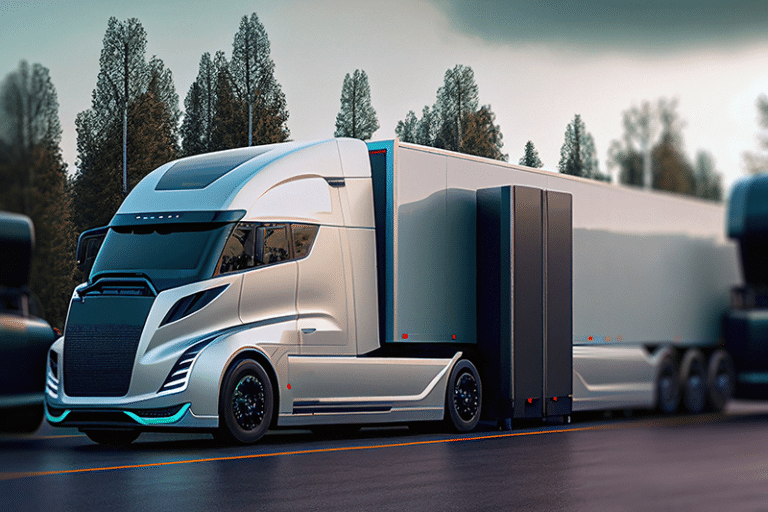Electric trucks are becoming an increasingly popular topic in the transportation industry.
These vehicles run on electricity instead of traditional gasoline or diesel fuel, making them a more sustainable option for businesses and individuals alike.
The market for electric trucks has been growing rapidly in recent years due to increased demand for sustainable transportation options. This trend is expected to continue as more businesses and governments prioritize reducing their carbon footprint.
Despite their many benefits, there are still challenges facing the widespread adoption of electric trucks.
One major issue is the limited driving range compared to traditional vehicles. High upfront costs also make it difficult for some companies to justify investing in these newer technologies.
However, advancements in technology and infrastructure offer hope for a brighter future for electric truck adoption rates.
Battery technology continues to improve, allowing for longer driving ranges over time. Charging stations are also becoming more widely available across the country.
How Electric Trucks Work
Electric trucks are powered by electric motors rather than internal combustion engines that run on gasoline or diesel.
Electric trucks work by converting electrical energy stored in batteries into mechanical energy, which propels the vehicle forward.
Here’s an overview of how electric trucks work:
- Energy Storage: Electric trucks rely on rechargeable batteries, usually lithium-ion, to store electrical energy. The capacity of the battery pack determines the range of the vehicle—how far it can travel on a single charge.
- Electric Motor: The electric motor is the heart of an electric truck. It converts the stored electrical energy from the battery into mechanical energy, which drives the wheels.
Electric motors can be either alternating current (AC) or direct current (DC) and come in various configurations, such as induction, permanent magnet or switch reluctance motors.
- Motor Controller: The motor controller regulates the amount of power supplied to the electric motor. It acts as a “throttle” and adjusts the speed and torque of the motor according to the driver’s input from the accelerator pedal.
- Transmission: Electric trucks generally have a simpler transmission system compared to internal combustion engine vehicles. Many electric trucks use a single-speed or two-speed transmission, since electric motors deliver high torque across a wide range of speeds, making multi-speed transmissions unnecessary.
- Regenerative Braking: One key feature of electric trucks is regenerative braking. When the driver applies the brakes, the electric motor works in reverse, acting as a generator to convert some of the kinetic energy back into electrical energy. This is then stored in the battery. This process helps slow down the vehicle while increasing its overall efficiency.
- Charging: Electric trucks need to be charged periodically to replenish the battery’s energy. Charging can be done through various methods, including Level 1 (standard household outlet), Level 2 (240V AC charging station), and DC fast charging stations, which offer a much quicker charge. Charging times depend on the battery capacity, charger type, and available power supply.
- Thermal Management System: Battery performance and lifespan can be affected by extreme temperatures. Electric trucks use thermal management systems to maintain optimal battery temperatures, ensuring efficient operation and preventing damage to the battery pack.
- Vehicle Control Unit (VCU): The VCU acts as the “brain” of the electric truck, managing various subsystems, such as the motor controller, thermal management system, and charging system. It ensures that all components work together efficiently and optimally.
Challenges of Electric Trucking
One of the most significant challenges facing the widespread adoption of electric trucks is range anxiety.
Range anxiety refers to the fear that an electric vehicle will run out of charge before reaching its destination. However, advances in battery technology are helping to alleviate this concern by increasing the range of electric vehicles.
Another challenge facing the widespread adoption of electric trucks is infrastructure. Currently, there are far fewer charging stations for electric vehicles than gas stations for traditional vehicles.
As a result, drivers of electric vehicles need to plan their routes carefully to ensure they have access to charging stations along the way.
Despite these challenges, many companies are investing in electric truck technology as part of their efforts to reduce emissions and improve sustainability.
For example, Amazon has ordered 100,000 custom-built electric delivery vans from Rivian with plans for them all on roads by 2030.
The Revolution Of Electric Trucking in the Automotive Industry
Tesla’s Cybertruck has been making headlines since its unveiling in November 2019. The all-electric pickup truck boasts impressive specs such as a range of up to 500 miles on a single charge, a towing capacity of up to 14,000 pounds, and acceleration from 0-60 mph in under 2.9 seconds depending on the model selected.
Pre-orders for the Cybertruck surpassed expectations with over 250,000 reservations within a week after its debut.
Ford also announced plans to produce an all-electric version of its F-150 pickup truck, which is currently one of the best-selling vehicles in America.
The company has released teaser images showing an F-150 prototype towing more than one million pounds worth of train cars. This demonstrates the impressive towing capacity of electric trucks, which was previously a concern for potential buyers.
The development of charging infrastructure for electric trucks is crucial for their widespread adoption and success in the market.
Companies such as Tesla and Electrify America are already working on building networks of fast-charging stations across the United States.
But there’s still much work to be done to ensure that electric trucks can travel long distances without running out of power.
Expansion Of The Electric Truck Market Beyond Pickups
Electric trucks are no longer limited to pickups, with manufacturers now offering a range of models including delivery vans, garbage trucks, and even semi-trucks.
The expansion of the electric truck market beyond pickups is being driven by increasing demand for sustainable transportation solutions in the commercial sector.
Delivery Vans
One example of this expansion is the growing popularity of electric delivery vans. Companies like Amazon and UPS have already begun incorporating electric vehicles into their fleets to reduce emissions and improve sustainability.
Electric delivery vans offer several advantages over traditional diesel-powered vehicles, including lower fuel and maintenance costs, reduced noise pollution, and improved air quality.
Garbage Trucks
Another area where electric trucks are making an impact is in waste management. Garbage trucks are notorious for their high levels of emissions, but electric garbage trucks offer a cleaner alternative.
Several cities around the world have already introduced electric garbage trucks into their fleets, including New York City and Paris.
Semi-Trucks
Perhaps the most exciting development in the expansion of the electric truck market beyond pickups is the emergence of electric semi-trucks.
While still in their early stages, companies like Tesla and Daimler have already unveiled prototypes for long-haul electric semi-trucks that could revolutionize the industry.
These vehicles offer significant cost savings over traditional diesel-powered semis, with lower fuel costs and reduced maintenance requirements.
Cost Savings
Electric trucks offer significant cost savings over their diesel counterparts due to lower fuel costs and reduced maintenance requirements. In addition to these direct cost savings, there may also be potential tax incentives available for companies that adopt electric vehicles into their fleets.
Environmental Impact
The adoption of electric trucks in industries such as logistics and waste management can have a significant impact on reducing emissions and improving air quality in urban areas.
With many cities around the world struggling with high levels of air pollution, switching to cleaner transportation options like electric trucks can help mitigate these issues.
Government Policies
Governments around the world are introducing policies and incentives to encourage the adoption of electric trucks, further driving the expansion of the market beyond pickups.
For example, in the United States, several states offer tax credits or rebates for companies that purchase electric vehicles.
In Europe, there are a variety of incentives available for companies that adopt electric vehicles into their fleets.
Battery Technology
As battery technology continues to improve, electric trucks will become increasingly viable for long-haul transportation, opening up new opportunities for the industry.
While current battery technology may limit the range of some electric trucks, advancements in battery technology could eventually make it possible for these vehicles to travel longer distances without needing to recharge.
Advantages of Electric Trucks Over Traditional Diesel/Gasoline Trucks
Lower Operating Costs
One of the most significant advantages of electric trucks over traditional diesel or gasoline trucks is their lower operating costs.
Electric trucks require less maintenance than traditional trucks because they have fewer moving parts and do not require oil changes. This means that companies can save money on maintenance costs and reduce downtime for repairs.
Another cost-saving advantage of electric trucks is that electricity is cheaper than diesel or gasoline.
According to a study by the National Renewable Energy Laboratory, the cost per mile for an electric truck is about half that of a diesel truck.
This means that companies can save money on fuel costs while also reducing their carbon footprint.
Reduced Emissions
Electric trucks produce zero emissions, making them a more environmentally friendly option compared to traditional diesel or gasoline trucks.
According to the Environmental Protection Agency (EPA), heavy-duty vehicles are responsible for 25% of greenhouse gas emissions from transportation in the United States.
By switching to electric trucks, companies can significantly reduce their carbon footprint and contribute to a cleaner environment.
Additionally, some cities offer incentives for companies that use electric vehicles, such as reduced tolls or access to restricted areas during peak traffic hours.
Quieter Operation
Another benefit of electric trucks is their quieter operation compared to traditional diesel or gasoline trucks.
Electric motors produce much less noise than combustion engines, making them ideal for night deliveries or in residential areas where noise pollution is a concern.
In fact, some cities have implemented noise ordinances that restrict the use of loud commercial vehicles during certain hours.
By using electric trucks, companies can comply with these regulations while also improving relations with local residents.
Improved Performance
Electric trucks have instant torque and acceleration, providing better performance compared to traditional diesel or gasoline trucks.
They also have a lower center of gravity due to their battery placement, resulting in better handling and stability on the road.
This improved performance translates to faster acceleration and better maneuverability, making electric trucks ideal for urban delivery routes with frequent stops and starts.
Additionally, electric trucks can travel longer distances without stopping for refueling, reducing downtime and increasing productivity.
Several companies have already made the switch to electric trucks and are reaping the benefits. For example, PepsiCo has committed to electrifying its entire fleet of 10,000 vehicles by 2030.
The company estimates that this will reduce its greenhouse gas emissions by 20% and save it $600 million in operating costs.
Similarly, UPS has been using electric trucks in its delivery fleet since 2001. The company currently has over 11,000 alternative fuel vehicles in operation worldwide, including electric trucks.
According to UPS, these vehicles have saved the company over $650 million in fuel costs since they were introduced.
The demand for electric trucks is also on the rise. According to a report by Navigant Research, global sales of medium- and heavy-duty electric trucks are expected to reach nearly 332,000 annually by 2026. This represents a compound annual growth rate of 25%.
Additionally, several countries have announced plans to phase out diesel or gasoline-powered vehicles in favor of electric vehicles.
Environmental Benefits of Using Electric Trucks
Zero Emissions
One of the most significant environmental benefits of using electric trucks is that they produce zero emissions.
This means that they don’t release harmful pollutants into the air, making them a cleaner and greener option for transportation. Diesel trucks, on the other hand, are notorious for their high levels of emissions.
By using electric trucks instead of diesel trucks, companies can significantly reduce their carbon footprint and contribute to the fight against climate change.
Reduced Carbon Footprint
The use of electric trucks can have a significant impact on reducing carbon emissions.
A study conducted by the International Council on Clean Transportation found that replacing diesel-powered delivery trucks with electric ones could reduce greenhouse gas emissions by up to 27%.
Several companies have already started investing in electric truck technology to reduce their carbon footprint.
For example, Amazon has ordered 100,000 custom electric delivery vans from Rivian, a Michigan-based startup company specializing in electric vehicle technology.
Noise Pollution Reduction
In addition to producing zero emissions, electric trucks also produce less noise pollution than traditional diesel trucks.
Noise pollution is a major concern in urban areas where residents are exposed to high levels of noise from traffic and other sources.
Electric trucks are ideal for urban areas because they produce less noise pollution than diesel trucks.
Lower Operating Costs
Electric vehicles require less maintenance than traditional combustion engine vehicles because they have fewer moving parts.
Furthermore, fuel costs are significantly lower for electric vehicles compared to diesel-powered vehicles.
According to a report by Bloomberg New Energy Finance (BNEF), battery-electric vehicles are expected to be cheaper to own and operate than diesel-powered vehicles by 2027.
Increased Energy Efficiency
Electric trucks are more energy-efficient than diesel trucks, which means they require less energy to travel the same distance. This reduces overall energy consumption and helps reduce greenhouse gas emissions.
Improved Air Quality
By using electric trucks, companies can help improve air quality in cities and reduce the negative health impacts associated with poor air quality.
Diesel trucks emit harmful pollutants such as nitrogen oxides (NOx) and particulate matter (PM).
These pollutants have been linked to respiratory illnesses such as asthma, bronchitis, and lung cancer.
By reducing the number of diesel trucks on the road and replacing them with electric trucks, we can help improve air quality in our cities and protect public health.
Cost Savings Associated with Owning and Operating Electric Trucks
Lower Fuel Costs
One of the most significant cost savings associated with owning and operating electric trucks is lower fuel costs.
Electric trucks have lower fuel costs compared to traditional diesel trucks, resulting in significant savings over time.
According to a report by the National Renewable Energy Laboratory (NREL), electric trucks can save up to 70% on fuel costs compared to diesel trucks.
Reduced Maintenance Costs
Electric trucks have fewer moving parts and require less maintenance, leading to lower maintenance costs.
In addition, electric vehicles do not require oil changes or tune-ups like traditional diesel vehicles.
Tax Incentives
Governments offer tax incentives for purchasing electric vehicles, which can help offset the higher upfront cost of electric trucks.
For example, in the United States, there is a federal tax credit of up to $7,500 for purchasing an electric vehicle.
Some states also offer additional incentives such as rebates or tax credits.
Longer Lifespan
Electric trucks have a longer lifespan than traditional diesel trucks, meaning they need to be replaced less frequently, resulting in long-term cost savings.
Improved Efficiency
Electric trucks have better energy efficiency than traditional diesel trucks, resulting in lower operating costs
Electric Trucks are the Future Of Sustainable Transportation
As more companies adopt electric truck technology, we will see a shift towards sustainable transportation practices that benefit both businesses and society as a whole.
By reducing our reliance on fossil fuels and embracing clean energy sources like electricity, we can create a cleaner, healthier future for ourselves and future generations. We at Canal Cartage also look forward to the future of logistics and shipping. We believe that such innovation can make us more efficient, all the while making Mother Nature happy.



